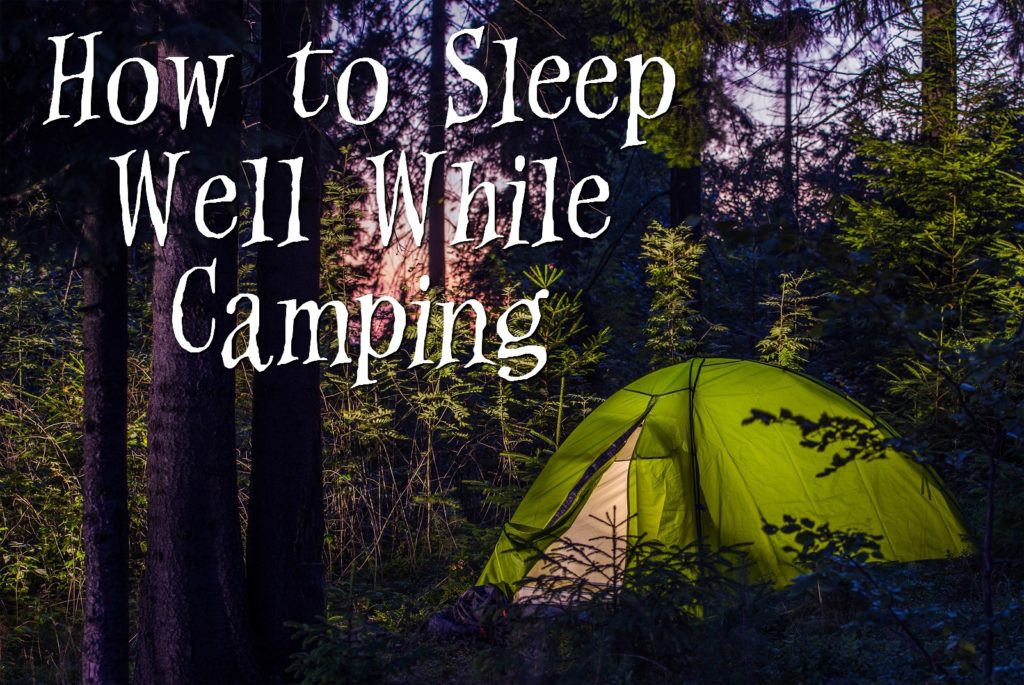Can you hear it Arizonans? With Memorial Day upon us and the schools letting out for summer vacation, nature is calling. Time to break out the camping gear and head out to the wilderness for a much-needed break from the everyday grind.

For many, camping is a peaceful, relaxing, and rejuvenating experience. However, some people find it difficult to fall asleep in the unusual surroundings of a tent, and without the usual comforts of home. The whole purpose of the getaway can be blown if you can’t get a good night’s sleep. For this reason, we have put together a list of seven things you can do to get quality sleep while camping.
- Bring the right bedding. Invest in a sleeping pad that inflates comfortably. This will keep you off the ground and allows you to adjust its firmness. Another option would be a foam pad of some sort. These offer some padding and keep you off the ground, but you lose the ability to adjust firmness. Don’t forget a pillow. Pillows can make a world of difference in your comfort when camping. If you have room and aren’t opposed to the idea, bring your regular pillow for extra comfort. Purchasing a small backpacking pillow is another option. Make sure you bring enough blankets so that you can add and remove them as needed, and/or invest in a comfortable sleeping bag that is made to handle the temperatures in which you are camping.
- Noise control. For some, the sounds of nature will lull them to sleep. Others will find the chirping and screeching of bugs or the occasional coyote howl difficult to sleep through. For those people, we recommend blocking out the noise or drown it out with sounds they find more pleasant. For light sleepers, ear plugs work magnificently. They are small, easy to pack, cheap and disposable! Another option would be to bring your iPod or load comforting sounds and music onto your smartphone and play soothing sounds at night.
- Manage the temperature. In higher elevations especially, the wilderness can become quite cold at night. Look at the weather forecast for your destination ahead of your trip to make sure you are bringing a sleeping bag that is made for the temperatures you will be sleeping in. If your sleeping bag does not cover the temperature range you need, and you don’t want to splurge on a new one, a cheaper option would be buying a sleeping bag liner. A liner can add up to 25 degrees of warmth. Another way to stay warm on a cold night is to try the hot water bottle trick. All you do is boil some water and pour it into a plastic, sealable water bottle and stick it in your sleeping bag before going to sleep. This will warm the sleeping bag nicely before you crawl in for the night. If you are concerned about getting too warm, bring sheets and blankets along to add or remove as you please.
- Go to bed tired. It is a lot easier to fall asleep in a tent after a full day of fishing or hiking rather than one that consisted of sitting around all day. Plan your days around going to bed early as there is much less to do outdoors once the sun goes down.
- Be mindful of your tent placement. Watch what angles your tent may have you in when you go to bed at night. You won’t be able to sleep comfortably if you are sliding into one corner of the tent at night or if your feet end up elevated above your head. Make sure you pitch your tent on level surfaces.
- Keep it clean. Okay, this may sound crazy, you are camping after all, but cleanliness helps one to fall asleep so hear us out. Use a bandana or pack a washcloth to sponge bathe with creek water or a water jug, or pack some baby wipes to clean up with after a long day of hiking and sweating. Not only will you sleep better not sticking to yourself, but others will sleep better because you won’t be stinking up the tent!
- Keep things dry. Waking up to a soaking wet tent in a puddle of water is the worst. Bring a waterproof tarp to set your tent up on to keep water from seeping through the seams. You may want to consider bringing a few extra waterproof tarps to make into a canopy or to throw over the top of your tent for extra rain protection. Nothing is more miserable than camping soaking wet- so, stay dry!
When done right, camping is a very relaxing and rejuvenating experience. We hope the above tips make it so that you have no trouble getting a good night’s rest on your next camp out.
If you are struggling to sleep at night and are not feeling rested throughout the day, schedule a consultation with the experts at the Valley Sleep Center. We can help you determine if your sleep problems are the result of an underlying sleep disorder or medical condition so that you can get the proper treatment and get the quality sleep you need.

